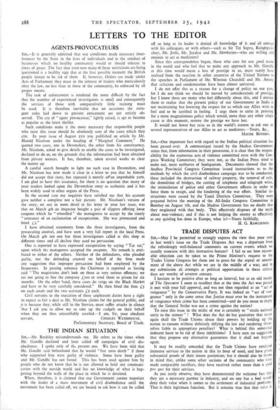AGENTS-PROVOCATEURS
LETTERS TO THE EDITOR
SIR,-It is generally admitted that war conditions made necessary inter- ferences by the State in the lives of individuals and in the conduct of businesses which no healthy community would or should tolerate in times of peace. The fact that even now many of these restrictions are being 'questioned is a healthy sign that at the first possible moment the British people intend to be rid of them If, however, Orders are made under Acts of Parliament they must in the interest of traders who meticulously obey the law, no less than in those of the community, be enforced by all proper means.
The task of enforcement is rendered the more difficult by the fact that the number of experienced investigators is small and consequently the services of those with comparatively little training must be used. It is therefore inevitable that on occasions the strin- gent rules laid down to prevent enticement are not strictly ob- served. The cry of " agent provocateur," lightly raised, is apt to become as popular as the latest thriller.
Such conditions make it the more necessary that responsible people who raise this issue should be absolutely sure of the cases which they cite. In your issue of August 2ISI you published an article by Mr. Harold Nicolson under the heading of " Marginal Comment." He quoted two cases, one in Devonshire, the other from his constituency. Mr. Nicolson, asked to give details to enable the cases to be investigated, declined to do so, on the grounds that the information had been obtained from private sources. It has, therefore, taken several weeks to clear the matter up.
A careful search brought to light no such case in Devonshire, and Mr. Nicolson has now made it clear in a letter to you that he himself did not accept that story, but repeated it merely a9san improbable yarn. I am glad to have this assurance, for there is no question that many of your readers looked upon the Devonshire story as authentic and it has been widely used in other organs of the Press.
In the second case my inquiries have satisfied me that his account gave neither a complete nor a fair picture. Mr. Nicolson's version of the story, set out in more detail in his letter in your last issue, was that on March"4th an inspector bought a pair of slippers offering loose coupons which he " wheedled " the manageress to accept by the timely " utterance of an exclamation of exasperation. She was prosecuted and fined £5."
I have obtained statements from the three investigators, from the prosecuting counsel, and have seen a very full report in -the local Press. On March 4th not one but three investigators called at this shop at different times and all declare they used no persuasion.
One is reported to have expressed exasperation by saying " Tut tut," upon which tht manageress accepted the coupons. No remark is attri- buted to either of the others. Neither of the defendants, who pleaded guilty, nor the defending counsel on behalf of the firm made any suggestion that improper persuasion had been employed by the Inspectors. In passing sentence the Chairman is reported as having said " The magistrates don't look on these as very serious offences; we are not going to fine the company £500 or send them to prison for six months. On the other hand, these cases do verge on the Black Market and have to be very carefully considered." He then fined the firm £5 on each count and the two assistants £2 each.
Civil servants in the execution of these unpleasant duties have a right to expect as fair a deal as Mr. Nicolson claims for the general public, and it is because they, while still in the Service, must suffer attacks in silence that I ask you to allow me to take up the cudgels on their behalf when they are thus unjustifiably assailed.—I am, Sir, your obedient
servant, CHARLES WATERHOUSE.
Parliamentary Secretary, Board of Trade.


























 Previous page
Previous page